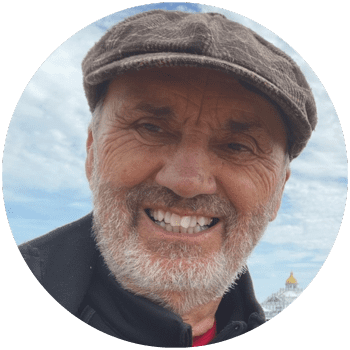He has been studying Spanish for three years, and is now at an intermediate level. He started learning as a challenge to keep his mind active and fell in love with the process.
- He started with Rosetta Stone and helped him learn some vocabulary, but was not enough.
- Don’t be swayed by the promises that you can learn a language in 3 months, it’s a life-long journey.
- Seeing his progress and always having a goal to achieve next is what keeps him going.
- Don’t overlook the grammar, it’s helpful to focus on it so you can later notice it in the things you read or watch.
- Variety is fundamental to keep him motivated, he works on different aspects of the language.
- In the beginning is where you have to put the most effort, so you can get to the “fun” stuff of speaking and understanding content you’re interested in as soon as possible.
She always wanted to learn a new language, and after retiring, she had the time for it. Christine started to learn Spanish also because she loves Spanish culture and to interact with the Hispanic community in California, where she lives.
- She started with Duolingo and it was ok but she felt it was not helping her speaking natural Spanish.
- A more structured approach allowed here to generalize what she learned in multiple contexts.
- Enjoying her conversations with a tutor helps her maintain her motivation.
- She likes to have trips to look forward to and research the culture and geography of the place.
- Being in Spain and 24/7 immersion took her Spanish to the next level and she would prioritize that if she started over.
- Once you’re in a foreign country, try to do the activities and hobbies you do back home.
- She believes flaschards are an effective way to learn vocabulary, specially with audio.
- You have to get of your own way, don’t overthink it and try to speak with people as soon as possible. People are very nice and pacient when you make the effort of speaking their language.
John is an English man in his 70’s. He started learning when his son, who lives in Spain, had a daughter, as she was going to be raised speaking Spanish.
- Started taking structured lessons with a teacher to get a good foundation.
- Doesn’t believe in just acquiring the grammar naturally, it’s better to do some study.
- Enjoys the podcasts and videos from Español con Juan.
- Recommends reading on Kindle for the instant translation feature.
- He recommends creating opportunities to have small interactions when you’re in Spain. For example, getting your newspaper at the same kiosk every day.
- If someone speaks English back to you in a restaurant or elsewhere, stick to Spanish!
- Doesn’t find memorizing word lists or taking notes on new words particularly helpful.
- The only two shortcuts: go spend a month in Spain by yourself (preferably in Antequera) and speak no English. Or find a Spanish speaking partner.
- Don’t believe people who promise you can learn a language in 3 or 6 months, it doesn’t work that way.
He started learning six years ago because of his frustration of not understanding what was going on in gatherings with his wife’s family, who is from Spain.
- He was overwhelmed by the options in the beginning and benefited greatly from more structure.
- He found Aula Internacional textbooks very useful and engaging.
- Start speaking as soon as possible, that’s what the language is for.
- Use tutors when starting for a safe zone, but realize that environment is not the real thing. Natives in a relaxed context speak much faster.
- Focus on the grammar, for him is the cornerstone of the language.
- He reviews his flashcards on Anki religiously. He uses sentences to learn words in context.



